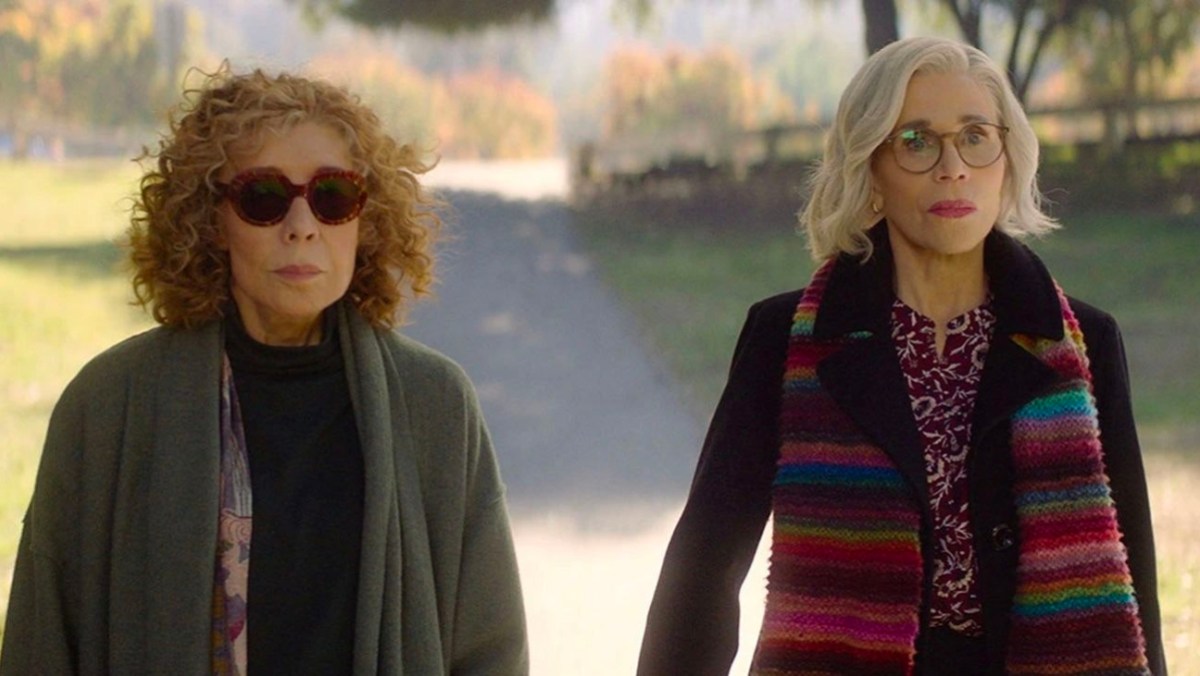“They deserve each other,” is a phrase you might use to describe an ex who denied her queerness and the shitty man she left you to marry. But when I say Jane Fonda and Lily Tomlin deserve each other I mean it in the best way.
With 114 years of industry experience between them — and after seven seasons of Grace and Frankie — there are few performers who can share a screen with these two legends as well as each other. The greatest strength of Paul Weitz’s Moving On is it allows them to do just that. Playing to both their dramatic and comedic strengths, the film is a showcase for their individual talents and their sparkling chemistry. Watching Fonda and Tomlin perform is like watching an Olympic athlete or a world-renowned ballerina. They are masters of their craft and it’s awe-inspiring to witness — even if the material doesn’t always live up to their skill.
Moving On is about two friends, Claire and Evie, who reunite at their other friend’s funeral. In college, the three of them were a trio. But over the decades, they’ve lost touch. Evie focused on living an out gay life and on her career playing cello. Claire got married for the second time, had kids, shrouded herself in a distant normalcy, and now has a corgi. And their friend stayed married to the husband her friends loathed. Claire and Evie both show up to the funeral with ulterior motives. In fact, Claire is there to kill that very husband.

This is a comedy but it’s a comedy about the decades-long impact of sexual assault. Claire’s life completely changed after this event — in ways that reveal themselves throughout the film — and now she wants revenge.
The film deftly draws parallels between the silence Claire kept regarding the assault and the silence Evie refused to keep regarding her sexuality. They are by no means the same but the film manages to display the possibilities of fighting back — and the limits. Patriarchy, homophobia, there is no good way to respond. There wasn’t half a century ago. There isn’t now.
Both women have their own subplots in the film that work to varying degrees. Claire reunites with her first husband — now a widow from his second marriage — and is faced with an alternate life she could have led. Richard Roundtree gives a subtle, tender performance as her ex that makes his absence from her life all the more painful.
Meanwhile, Evie has become a sort of surrogate grandma to the grandchild of another man in her retirement home. Evie sees this child’s queerness and wants to encourage what his own family does not. The early scenes between these two characters are very sweet and powerful which makes it all the more frustrating how this story concludes. The harshness of the child’s parents is overwrought and plays into the trope of homophobic Latino families. The mother also uses a wheelchair and it feels odd to have the only disabled character play a one-note villain.
The film as a whole also falters in its final act. The first hour is a sharp mix of tones, a traumatic farce that allows its wonderful cast to do what they do best. But as it nears its conclusion, there’s one too many predictable twists and faux-climaxes. An 85 minute movie should not feel long. This starts to feel long.
Nevertheless, this is still a worthwhile vehicle for its stars. When it works, it really works, and it’s rare to get a film about older characters — especially with an older queer character — that for the most part feels fresh and progressive.
As long as Jane Fonda and Lily Tomlin are acting, I hope they act together. There are plenty of assholes left to kill, plenty of jokes left to tell, plenty of chemistry left to enjoy. Seven seasons of a show wasn’t enough. Give me Moving On 2.



Thank you for this, Drew! I love Lily Tomlin, especially when she’s sharing a screen with Jane Fonda, and I had been wondering whether to check this movie out – I definitely will now.
Hadn’t heard of this. My misandry is intrigued! The sexual assault is not shown, is it? Unconsentingmedia.org doesn’t list it and doesthedogdie.com doesn’t say.
It is not shown, but it is described in detail.
Reply me to death if you want, but I’m going on record: Tomlin and Fonda deserve to be in the echelons of all time Great pairings. Laurel and Hardy, Abbott and Costello, Astaire and Rogers, Charles and Visage. Two icons coming together and making art that is iconic in its own right. I hope they get their appreciation before it’s too late.